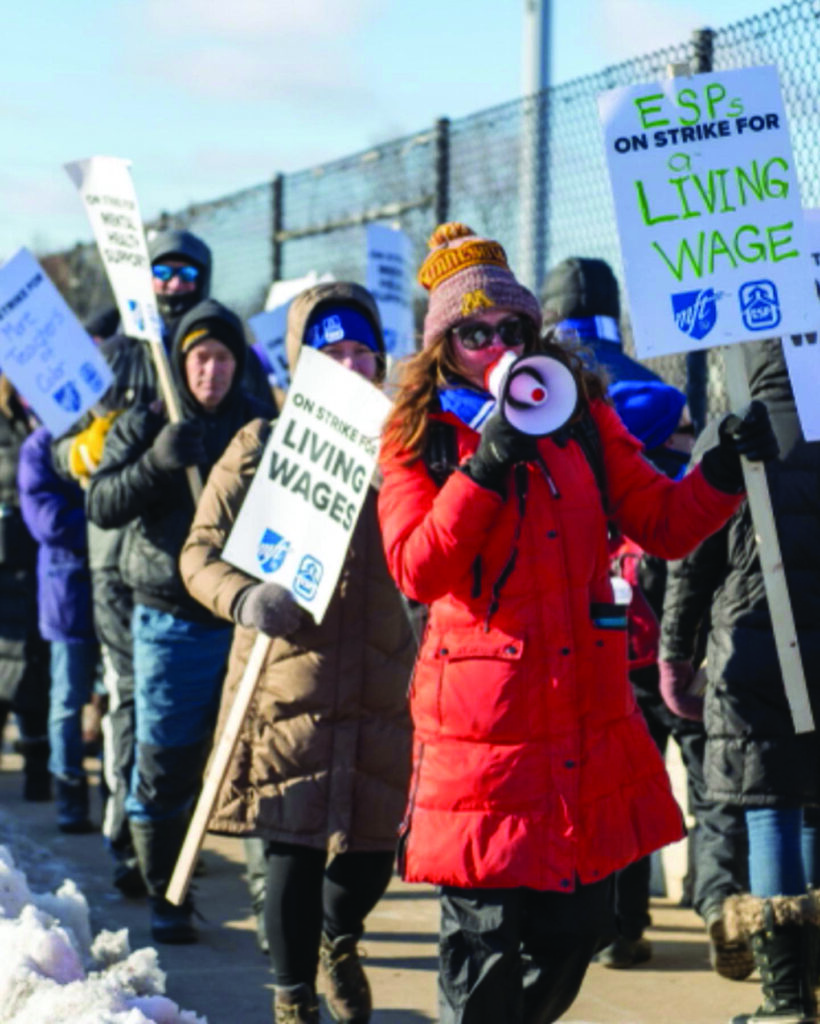Minneapolis and Saint Paul are the latest examples of locals who have two or more bargaining units in negotiations and whose licensed staff are putting education support professional issues at the forefront.

“We’ve never worked closer,” said Shaun Laden, the ESP chapter president of the Minneapolis Federation of Teachers and Education Support Professionals. “A lot of credit goes to (the licensed staff) really being clear that ESP pay is our top issue for our local as a whole. In our ESP chapter, it’s lifted a lot of spirits to hear our licensed colleagues say this is their biggest priority.”
The top priority for both MFT units while in negotiations has been for ESPs to make a living wage. Their proposal to the district, as of press time, was a starting salary of $35,000. The local is on strike because the district is not agreeing to this proposal and more, as of press time.
“I’ve been doing this job for over 10 years for Minneapolis Public Schools, but still my pay stub from last year, I barely made over $20,000 dollars,” said Elizabeth Thompson, an ESP member.
The Saint Paul Federation of Educators settled their contract the night before they were set to go on strike. SPFE went on strike in 2020 over issues like increased wages and support for ESPs, as well as more mental health supports for students and class size caps. During negotiations, the local wanted to build on the improvements for students and educators from two years ago, as well as keep some of the wins the district was proposing to remove.
“This round was quite different in that the district truly believed we were ready to go on strike again,” said SPFE President Leah VanDassor. “We made it clear to them that our membership was ready to walk over educational assistant pay levels, even though they are a fairly small portion of our overall membership. We all know how valuable EAs are for our students and our district.”
SPFE proposed and won significant wage increases for EAs and technology that would allow them to better perform their jobs and communicate with families. The tentative agreement was ratified by SPFE members on March 16.
In Saint Paul, educational assistants will receive an average 13.5 percent wage increase. By the end of the contract, the starting hourly rate for EAs will be at $18.82, up from $15.94. The median compensation for EAs will be at $49,664 by the end of the contract. All staff will receive a $3,000 one-time recognition payment for pandemic work ($1,500 for those who worked during the 2020-21 school year and $1,500 for work in the 2021-22 school year). ESPs will also receive an increased employer contribution to health insurance.
Osseo ESPs also saw support from their licensed staff union and other bargaining units throughout negotiations.
“Everybody was struggling,” said Becky Hespen, the Osseo ESP president, last spring. “We know there is power in numbers. We’re separate locals, but we are all Education Minnesota.”
“Together that voice is amplified,” said Kelly Wilson, the president of the Osseo teachers local, who also represents the Kidstop instructors and nurses, about supporting the ESPs during their bargaining. Wilson and his unit didn’t start formally bargaining until the ESP contract was settled.


